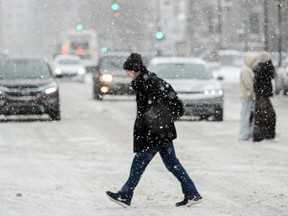Entertainment
Midlife Adults Face Challenges Balancing Caregiving and Work

Adults in their late midlife are increasingly burdened by the demands of caregiving while trying to maintain their own well-being. According to Statistics Canada, individuals aged 55 to 64 collectively worked over 100 million hours per month across various professions from August 2024 to July 2025. This demographic plays a crucial role in supporting both younger and older generations, often at the expense of their own health.
The Caregiving Landscape
Many Canadians in this age group are engaged in formal volunteering, contributing an estimated 552 million hours annually to community services such as crisis centres and schools. Additionally, they spent 1.342 million hours on unpaid informal volunteer work, primarily aiding family members. Notably, baby boomers alone dedicated 1,219,000 hours of their informal volunteer efforts to help relatives like parents and siblings.
Research indicates that the COVID-19 pandemic exacerbated these challenges, with many caregivers adding an extra 20 hours of caregiving to their work weeks. This situation highlights the precarious balance these individuals maintain, often leading to significant mental and emotional strain.
Current studies reveal that approximately one in five midlife women is responsible for caring for a child, while more than one-third provide care for an adult relative. The average caregiver dedicates around 35 hours per week to these responsibilities, which can lead to feelings of anger and depression when the burden becomes too great.
Financial Pressures and Mental Health
The economic landscape further complicates matters. Many caregivers are forced to work full-time jobs, with 60% of them struggling to find formal support services. Alarmingly, 40% of working caregivers express concerns about meeting their financial obligations. These pressures contribute to a pervasive sense of anxiety and fatigue among caregivers, who often start their days feeling overwhelmed.
Additionally, the trend of young adults aged 20 to 35 moving back in with parents adds another layer of complexity. With individuals aged 55–64 holding two-thirds of Canada’s household wealth, it is common for younger adults to save for the future while living at home. However, this arrangement is not without its challenges, as studies show that 18% of young adults report experiencing high anxiety, and 13% struggle with depression.
During the pandemic, late midlife Canadians reported feeling more mentally distressed than older adults, often facing isolation and judgment. Research has also identified family conflicts as a significant stressor, increasing the risks of mental health issues, including anxiety and suicidal thoughts.
Despite the high demand for care services, this demographic is often reluctant to seek help. About 25% of those who needed health services faced difficulties in accessing them. Many prefer to manage their challenges independently, leading to a lack of support in times of need.
Changing Perceptions of Aging
Insights from psychologist Erik Erikson suggest that societal changes can influence perceptions of aging. Prior to the pandemic, a survey of over 500 Canadians in their 50s revealed a generally pessimistic outlook on aging, particularly regarding health and social connections. Many expressed fears about loneliness and a lack of meaningful friendships.
As these individuals navigate the complexities of caregiving and personal growth, the importance of prioritizing self-care becomes clear. Late midlife adults currently anticipate facing poor health by age 71 and fear their own demise around age 81. Financially, many are managing an average debt of $300,000 and feel unprepared for the rising cost of living, especially as they live paycheck to paycheck.
Despite their significant contributions as caregivers, late midlife adults often find themselves without adequate recognition or support. Federal funding priorities tend to focus on youth programs, neglecting the needs of this crucial demographic. It is imperative to engage in conversations about the pressures faced by late midlife Canadians, exploring how these individuals manage their burdens and ensuring they receive the care and respect they deserve.
As this demographic continues to serve as a vital resource within Canadian society, understanding their challenges is essential for fostering a supportive environment. The ongoing dialogue about their roles and needs is not just beneficial but necessary for promoting their well-being and ensuring they can continue to support both younger and older generations.
Research conducted by Gail Low, who is affiliated with the RTOERO Foundation and MacEwan University, alongside Gloria Gutman, Professor Emerita at Simon Fraser University, highlights the urgent need for recognition and support for midlife adults in Canada. Their work underscores the importance of addressing the unique challenges faced by this demographic as they navigate the complex landscape of caregiving and personal health.
-

 Politics4 weeks ago
Politics4 weeks agoSecwepemc First Nation Seeks Aboriginal Title Over Kamloops Area
-

 World5 months ago
World5 months agoScientists Unearth Ancient Antarctic Ice to Unlock Climate Secrets
-

 Entertainment5 months ago
Entertainment5 months agoTrump and McCormick to Announce $70 Billion Energy Investments
-

 Science5 months ago
Science5 months agoFour Astronauts Return to Earth After International Space Station Mission
-

 Lifestyle5 months ago
Lifestyle5 months agoTransLink Launches Food Truck Program to Boost Revenue in Vancouver
-

 Technology3 months ago
Technology3 months agoApple Notes Enhances Functionality with Markdown Support in macOS 26
-

 Lifestyle3 months ago
Lifestyle3 months agoManitoba’s Burger Champion Shines Again Amid Dining Innovations
-

 Top Stories2 months ago
Top Stories2 months agoUrgent Update: Fatal Crash on Highway 99 Claims Life of Pitt Meadows Man
-

 Politics4 months ago
Politics4 months agoUkrainian Tennis Star Elina Svitolina Faces Death Threats Online
-

 Sports5 months ago
Sports5 months agoSearch Underway for Missing Hunter Amid Hokkaido Bear Emergency
-

 Politics5 months ago
Politics5 months agoCarney Engages First Nations Leaders at Development Law Summit
-

 Technology5 months ago
Technology5 months agoFrosthaven Launches Early Access on July 31, 2025





















